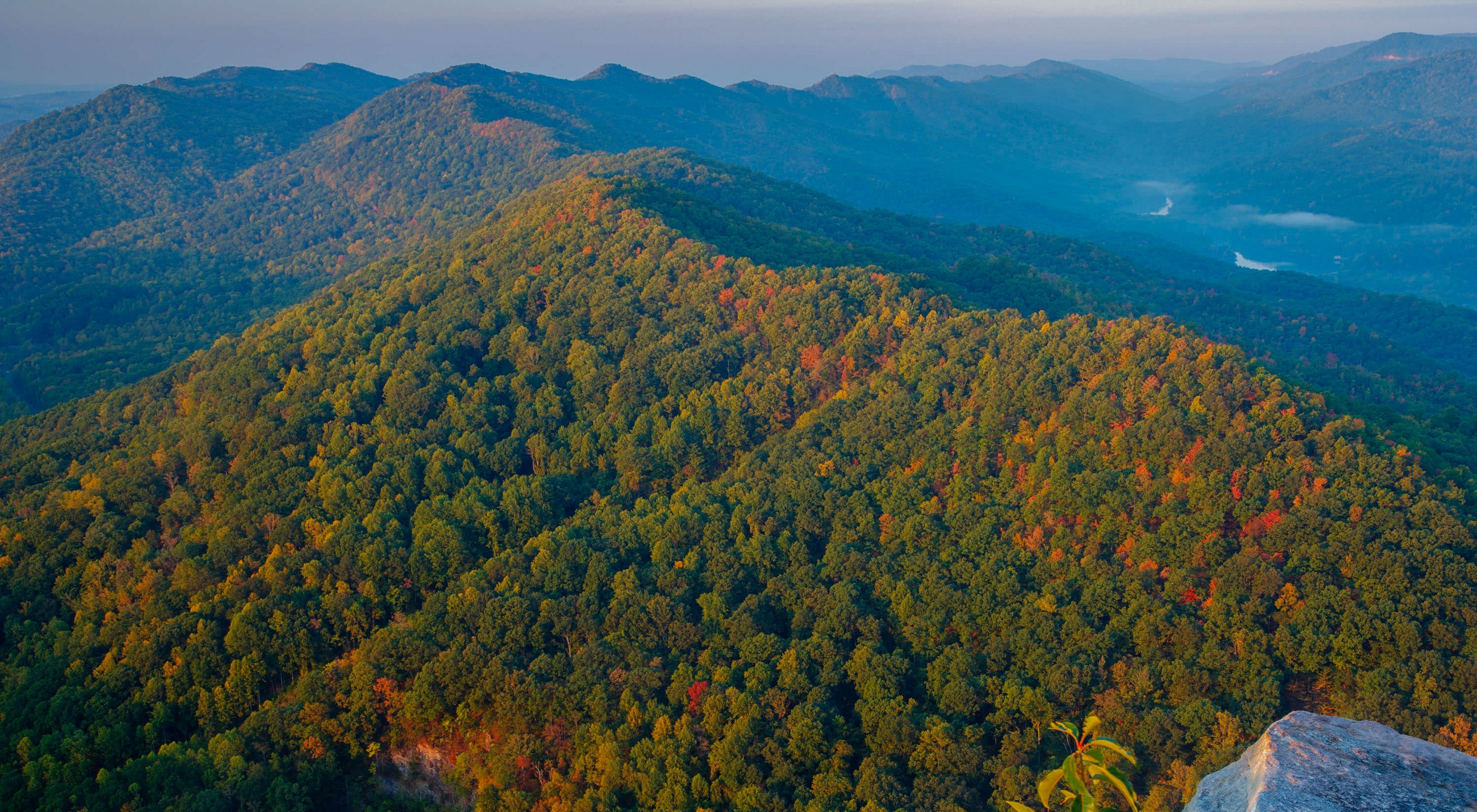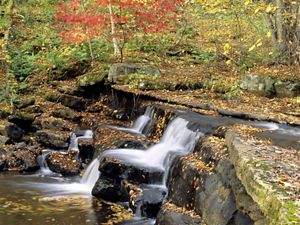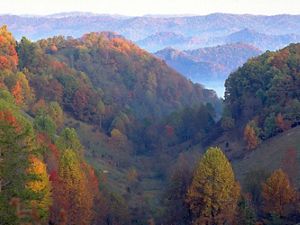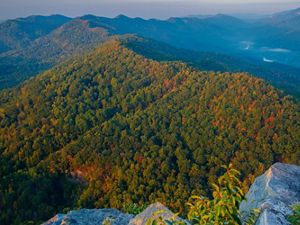TNC Announces Innovative Collaboration for Solar Development in Central Appalachia
The Nature Conservancy, Sun Tribe and Sol Systems will pursue the development of some of the first utility-scale solar projects on former coal mines in the region.
Media Contacts
-
Kelley Galownia
The Nature Conservancy
Email: kelley.galownia@tnc.org
The Nature Conservancy today announced an innovative collaboration with two renewable energy companies who will pursue the development of some of the first utility-scale solar projects in the Central Appalachian coalfields. The two companies include Charlottesville, Virginia-based Sun Tribe, and Washington, D.C.-based Sol Systems.
The solar systems will be built on former coal mines located within the Cumberland Forest Project—nearly 253,000 acres of land in Southwest Virginia, Eastern Tennessee, and Eastern Kentucky managed by TNC and owned by its Cumberland Forest, LP impact investment fund. The Cumberland Forest Project is aimed at protecting and restoring globally important Appalachian forests, which are some of the most important areas for climate resiliency in North America.
Sun Tribe and Sol Systems—chosen in part because of their shared and demonstrated commitment to community-focused impact and results—will develop the projects with the aim of continuing TNC's goal of supporting local economies through conservation, investment and engagement.
“Southwest Virginia and the wider Central Appalachian coalfield region is uniquely positioned to support the expansion of renewable energy development with hundreds of reclaimed former surface mines potentially capable of being converted to new solar projects,” says Brad Kreps, director of TNC’s Clinch Valley Program. “At this point, the region’s former mined lands are nearly a blank canvas when it comes to building a new renewable energy economy, and with this partnership we hope to demonstrate how some of these former mining sites can be competitive for solar development in Virginia and throughout the Central Appalachian region.”
The Cumberland Forest Project was developed to show that investments in nature can yield financial returns and critical conservation results while returning value to local communities. This is especially important in the Central Appalachian region, which is undergoing a profound transition as the coal industry declines and the area seeks to develop a more diverse economy while building on its strength as an energy producer.
“We’re a proud Virginia-based company, and we’re looking forward to working with communities throughout this region to show that solar can provide real environmental, social, and economic benefits for those who call Central Appalachia home,” says Danny Van Clief, CEO of Sun Tribe Development. “We are focused on an approach that combines a conservation focus, comprehensive scale, and an intense focus on local community investment. Turning this vision into reality will mean that these former coal mines, which have served these communities for generations as energy assets, can continue to serve them for generations to come in a bright future.”
On the vast majority of the Cumberland Forest, TNC’s aim is to protect and restore native forests, but there are several thousand acres of non-forested, former surface coal mines on the property that can potentially support new solar energy projects, create positive economic outcomes for local people, and provide clean energy from previously disturbed sites in a way that minimizes impact to the environment. The initial focus area for the collaboration with Sun Tribe and Sol Systems centers on Wise County in Southwest Virginia.
“This collaboration highlights Sol Systems’ mission to pair new solar energy infrastructure investment with concrete and scalable community, sustainability, and environmental impact,” says Yuri Horowitz, CEO and co-founder of Sol Systems. “We’re excited to be working with The Nature Conservancy and its Cumberland Forest Project, along with Sun Tribe to create new long-term opportunities for communities and neighbors in Southwest Virginia.”
Cumberland Forest Solar Siting and Developer Selection Process
In pursuing solar development on the Cumberland Forest property, TNC is taking a strategic approach to create positive outcomes for both nature and people. In early 2020, with assistance from the Virginia Department of Mines, Minerals, and Energy, TNC identified non-forested former mined lands on the Cumberland Forest property that are in proximity to existing utility lines and infrastructure, making them candidates for solar development.
TNC’s scientists then conducted additional analyses of these potential solar sites to eliminate areas that possess important wildlife values, natural habitats, or other characteristics that make them incompatible with solar development. After that, TNC engaged the private sector, seeking proposals from a variety of solar developers interested in constructing solar projects on some of these identified sites. After a nine-month process, Sun Tribe was selected to be the Cumberland Forest LP’s first project developer, with Sol Systems selected to finance, own, and operate the facilities once development is complete.
“Our competitive selection process focused not only on finding capable solar developers with a strong track record but was also geared towards finding developers with a demonstrated commitment to environmental stewardship and the creation of tangible benefits to local communities” says Tom Hodgman, Deputy Managing Director of Forest Investing of The Nature Conservancy’s NatureVest. “Sun Tribe and Sol Systems have committed to ensuring that the projects also benefit the communities we are trying to support with them.”
The Path Forward: Permitting and Community Engagement
Over the next two to three years, Sun Tribe will conduct additional field studies, pursue utility interconnection agreements, and submit local and state level permit applications on sites located within the Cumberland Forest property.
During this initial development period, Sun Tribe will also work with TNC, localities, the Southwest Virginia Solar Work Group, and other interested stakeholders to develop a Community and Environmental Benefits Plan that will target specific investments in local workforce development, economic development, and environmental stewardship. Current projections assume projects will move towards construction and operation in 2023-2024.
“This is a significant economic opportunity for the region, but developing solar at this scale is a complex process that requires a variety of studies and approvals related to land use, the electric grid, the environment, and the construction and operation of the solar farms themselves,” says Van Clief. “We are eager to begin working closely with the community, along with the region’s educational, business, and environmental leaders, to get these projects across the finish line.”
Enabling Renewable Energy Policies in Virginia
Much of the optimism around this project is driven by enabling policies recently passed in Virginia that encourage the development of renewable energy, including solar. Over the past several years, Virginia lawmakers and private business interests have taken great strides towards becoming a leader in the clean energy space. A big driver of this shift is the Virginia Clean Economy Act, which was signed into law in 2020. It calls for Virginia’s electric utilities to produce their electricity from 100 percent carbon-free sources by 2050. The legislation also declares 16,100 megawatts of solar and onshore wind generation facilities to be in the public interest.
Solar projects constructed on the Cumberland Forest will contribute towards these goals. In addition to the Virginia Clean Economy Act, other policies have been put in motion recently to specifically encourage the redevelopment of former mined lands and brownfields as sites for renewable energy projects. For example, Delegate Terry Kilgore sponsored legislation in the 2021 General Assembly Session that established the Virginia Brownfield and Coal Mine Renewable Energy Grant Fund and Program.
“As we pursue the expansion of renewable energy in Virginia, it’s important to make sure that this exciting opportunity touches down across all parts of the Commonwealth,” says Delegate Terry Kilgore. “This includes Southwest Virginia, which has a long history of being an energy leader. I’m pleased that we now have a policy in place that incentivizes the re-use of mined lands and brownfields for renewables, and I’m thrilled that The Nature Conservancy and its partners are pushing forward to demonstrate that we can develop solar in this part of Virginia.”
Local Investment; National Impact
TNC’s efforts to work with solar developers on the Cumberland Forest and in the Central Appalachians are part of a larger organizational effort focused on supporting the expansion of clean energy while simultaneously benefiting local communities and avoiding impacts to forests and other critical wildlife habitats. Part of that effort involves serving as a national leader—showing other conservation-focused organizations, communities, and renewable energy developers that there is a successful model for synergy between conservation and renewable energy development. Significant components of that work include siting renewable energy projects on former mined lands and brownfields and highlighting the importance of transitioning towards a culture of generation that continues to honor the region’s history as an energy center while diversifying how energy is produced.
The national impact of this work will be seen through the power of example and the creation of a new framework—a local engagement and education-focused collaboration that strives to meet the needs of local residents and places community engagement at the center of the development process. Both Sun Tribe and Sol Systems have histories of this kind of neighborhood-focused effort and will work closely with TNC to build strong solutions that bring new jobs, workforce development, increased tax revenue, and a host of other benefits to Central Appalachia. Sun Tribe will take the lead in the permitting, approval, and development process, while Sol Systems will finance, construct, own, and operate each project.
The Nature Conservancy is a global conservation organization dedicated to conserving the lands and waters on which all life depends. Guided by science, we create innovative, on-the-ground solutions to our world’s toughest challenges so that nature and people can thrive together. We are tackling climate change, conserving lands, waters and oceans at an unprecedented scale, providing food and water sustainably and helping make cities more sustainable. Working in more than 70 countries and territories, we use a collaborative approach that engages local communities, governments, the private sector, and other partners. To learn more, visit nature.org or follow @nature_press on Twitter.



